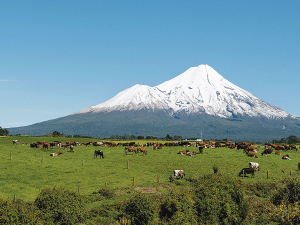Open Country opens butter plant
When American retail giant Cosco came to audit Open Country Dairy’s new butter plant at the Waharoa site and give the green light to supply their American stores, they allowed themselves a week for the exercise.
 Over the years small family farms in Taranaki have merged into bigger units to remain viable, says Marise James.
Over the years small family farms in Taranaki have merged into bigger units to remain viable, says Marise James.
Marise James describes her 38-year career as a rural and farmer advisor as one that has ridden the waves of many changes.
These range from aggregation of dairy companies, to the formation of Fonterra, to the demise of the small family farm as it gave way to larger-scale operations to stay viable and meet increasing compliance pressures.
"We've also ridden the wave of milk growth that flooded the South Island and other traditionally non-dairy areas of the country, in the late 1990s and early 2000s, followed by the Global Financial Crisis in 2008," she told Dairy News.
"I've seen the industry go from one that was regarded as the backbone of the New Zealand economy to an industry now threatened by idealistic and impractical responses to climate change, Covid and the ongoing consequences of various fiscal policies."
James, who retired last month from her role as Business Advisory Services director, Taranaki, at Baker Tilly Staples Rodway, says throughout it all, she has supported farmers through the ever-changing attitudes of banks to rural lending.
"There is always something to deal with and it hasn't always been about crunching numbers. Often it is about counselling and guiding people to make the best decision to suit them and their situation."
James has decided to "stand aside for the next generation of advisers".
"Many of my clients are my age, and I am now starting to advise their children as they take up their place in the industry, so it makes sense to let them work alongside people with similar interests and outlooks on life."
Commenting on the Taranaki region, James notes that small family farms have merged into bigger units to remain viable.
"It is hard to support a family on a 40ha dairy farm these days. Also, capital gain is much less of a backstop these days. Farms need to be operationally profitable to manage debt.
"Higher equity ratios are also important in managing milk price volatility. And technology is changing the landscape and infrastructure of dairy farms.
"Who would have thought that you could sit at home having a coffee, and at the same time change your virtual fences to shift your cows to a new paddock or get them to come to the dairy shed for milking? This sort of thing is game-changing."
But she says the fact that farms can no longer rely on capital gain to achieve wealth creation has been one of the biggest changes over her career.
"Our firm spends a lot of time these days assisting farmers with budgeting and variance reporting to ensure they have real-time information that assists them with timely and logical decision-making.
"We also assist with things such as bank financing, using hedging tools for interest rates and milk prices, and generally just being a sounding board for them.
"Quite a few of our clients operate advisory boards that we help with, and we find this format invaluable when it comes to sharing ideas and solutions before coming to a decision the client is happy with. The old saying 'two heads are better than one' still rings true."
Challenging Times
The recent economic downturn, with low commodity prices, high interest rates and soaring input costs, was one of the worst Marise James has seen.
"Mainly because it has lasted the longest," she says. "The GFC was bad, but we came out of that pretty quickly. The drop in milk price in 2015 and 2016 was devastating but we managed to get through that with sensible support from the banks, and interest rates were relatively low.
"The current downturn is a triple whammy with volatile milk/product prices, massive on-farm inflation and exorbitant interest rates. Many farmers were getting up to milk every morning knowing they were losing money over the past two to three years."
James believes 2025 will remain a challenge for some farmers.
"I think it is always challenging in the ag sector. Not only are farmers at the whim of the weather, but they are the ultimate price taker - they get paid last.
"Volatility is part and parcel of being a farmer, so systems need to be resilient enough to withstand these vulnerabilities. And when times are good, farmers need to be sensible with those bonuses and ensure debt is maintained at sensible levels and repairs and maintenance is optimised."
Legal controls on the movement of fruits and vegetables are now in place in Auckland’s Mt Roskill suburb, says Biosecurity New Zealand Commissioner North Mike Inglis.
Arable growers worried that some weeds in their crops may have developed herbicide resistance can now get the suspected plants tested for free.
Fruit growers and exporters are worried following the discovery of a male Queensland fruit fly in Auckland this week.
Dairy prices have jumped in the overnight Global Dairy Trade (GDT) auction, breaking a five-month negative streak.
Alliance Group chief executive Willie Wiese is leaving the company after three years in the role.
A booklet produced in 2025 by the Rotoiti 15 trust, Department of Conservation and Scion – now part of the Bioeconomy Science Institute – aims to help people identify insect pests and diseases.